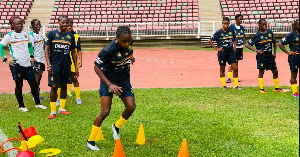French-speaking West and Central Africa are generating strong revenues and could emerge as top investment destinations despite pockets of turmoil and uncertainty over a series of looming elections, Citibank said.
A track record of coups and civil wars has historically made many investors wary of the region, which is still struggling with unrest in Mali, turmoil in Central African Republic and the spillover from Nigeria's Boko Haram Islamist insurgency.
However, Kevin Murray, Citi's managing director for West and Central Africa, said growth in sectors ranging from large-scale infrastructure to agriculture and telecommunications is creating big investment opportunities.
"Last year across this region we had a 19 percent increase in revenues year-on-year. I continue to believe that the opportunities are very good, with Ivory Coast being the belle of the ball," he told Reuters in an interview on Thursday.
Not long ago Ivory Coast, the largest economy in the West African Economic and Monetary Union (UEMOA), was itself among the region's trouble spots.
A coup in 1999 was followed by a civil war three years later that divided the country -- the world's top cocoa producer -- between northern rebels and southern government loyalists, spawning a decade-long crisis that crippled the economy.
The years of turmoil ended with a brief 2011 post-election conflict that saw Alassane Ouattara, a former International Monetary Fund official, emerge as president.
Ivory Coast is now approaching double-digit growth, driven mainly by a long-awaited infrastructure makeover.
"If the October elections pan out well, as expected, then we will see a flood of investment into the country," Murray said.
Elections have traditionally bred unrest in the region. Polls are also due to take place in Guinea, Burkina Faso, Togo and Central African Republic this year. A vote due in giant Nigeria is likely to have regional ramifications, good or bad.
Benin, Cape Verde, Chad, Gabon, Niger and both Congos are all expected to hold elections in 2016.
SETTING EXAMPLE
Murray said peaceful polls in Ivory Coast could serve as an example to its neighbours of the economic dividends of a transparent democratic process.
"The risks start with the politics. Elections are still playing a central part in the economic development of this region," he said.
Led by Ivory Coast, which makes up 40 percent of the bloc's economy, UEMOA forecasts economic growth of 7.2 percent, bolstered by heavy investments in infrastructure, outpacing an IMF prediction for sub-Saharan Africa of 5.8 percent.
UEMOA groups Benin, Burkina Faso, Ivory Coast, Mali, Guinea-Bissau, Senegal, Niger and Togo.
"The current high level of infrastructure is great, but it takes a while to trickle down. Once this does happen, then the (central bank's) 7.2 percent estimate for 2015 will start to look conservative," Murray said.
While it has yet to publish a 2015 forecast, Central Africa's CEMAC zone estimated growth of 4.9 percent in 2014, lower than expected due to the drop in oil prices.
The CEMAC monetary union includes Gabon, Republic of Congo, Equatorial Guinea, Cameroon, Chad and Central African Republic. Oil accounts for almost 40 percent of the region's GDP and nearly 90 percent of exports.
Murray said lower oil prices would push the region's crude producers to accelerate economic diversification plans, which he said were essential for long-term sustainability.
"There is every reason to believe they will emerge stronger," he said. "If the economy is operating at a decent rate at $50 a barrel, then it will be doing extremely well when the price per barrel goes up."
Actualités of Friday, 6 March 2015
Source: Reuters












